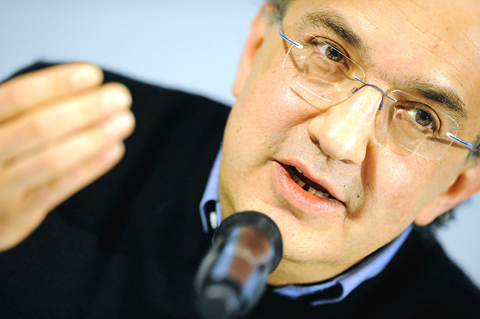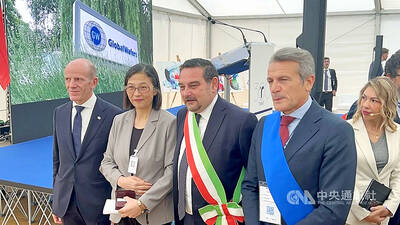US President Barack Obama will unveil tomorrow a much-anticipated plan on the future of ailing US automakers, his spokesman said on Friday.
“A task force is meeting today. They are finishing up the decisions that have to be made and put in place. The president will make an announcement on Monday,” spokesman Robert Gibbs said.
Obama’s auto task force has been working to solve the woes of the “Big Three” US automakers that have been pushed to the brink of bankruptcy in the economic recession amid a global downturn in car sales.

PHOTO: AFP
Two of the firms, General Motors (GM) and Chrysler, have asked for another US$21.6 billion in US aid on top of the US$17.4 billion in emergency loans approved in December as they struggle to survive.
Both companies face a Tuesday deadline to turn in finished restructuring plans to the government, but neither company is likely to have everything done. Neither GM nor Chrysler have deals with the union on the trust funding or concessions from their debtholders, although talks are continuing.
Ford, the other in the trio, has said it had enough cash to survive the downturn without government aid.
Obama made clear on Thursday that the companies would face having to make tough concessions for additional aid, but it was unclear if that meant concessions beyond the initial loan terms.
The president said if the companies were “not willing to make the changes and the restructurings that are necessary, then I’m not willing to have taxpayer money chase after bad money.”
Republicans were signaling their opposition to Obama’s approach.
“Everyone wants America’s automakers to not only survive, but thrive. That’s why it’s difficult to understand the logic of adding more burdens and requirements to the very companies that are struggling to stay afloat,” said Antonia Ferrier, a spokeswoman for House Republican Leader John Boehner.
The Obama administration is likely to demand deeper concessions from Chrysler and GM in exchange for additional federal loans, a person briefed on the government’s plan said on Friday.
The concessions could go beyond the requirements imposed by the administration of former US president George W. Bush when it agreed to loan the automakers money last year, said the person, who asked not to be identified because the government’s plans have not been revealed.
Separately, the head of Italian auto giant Fiat on Friday slammed state aid given to the car industry in the UK, France and Sweden, saying it was “very dangerous” and hurt competition in the sector.
“These are very dangerous unilateral decisions,” Sergio Marchionne said at the company’s annual general meeting in the northern Italian city of Turin, which was targeted by workers protesting layoff conditions.

RECYCLE: Taiwan would aid manufacturers in refining rare earths from discarded appliances, which would fit the nation’s circular economy goals, minister Kung said Taiwan would work with the US and Japan on a proposed cooperation initiative in response to Beijing’s newly announced rare earth export curbs, Minister of Economic Affairs Kung Ming-hsin (龔明鑫) said yesterday. China last week announced new restrictions requiring companies to obtain export licenses if their products contain more than 0.1 percent of Chinese-origin rare earths by value. US Secretary of the Treasury Scott Bessent on Wednesday responded by saying that Beijing was “unreliable” in its rare earths exports, adding that the US would “neither be commanded, nor controlled” by China, several media outlets reported. Japanese Minister of Finance Katsunobu Kato yesterday also

‘DRAMATIC AND POSITIVE’: AI growth would be better than it previously forecast and would stay robust even if the Chinese market became inaccessible for customers, it said Taiwan Semiconductor Manufacturing Co (TSMC, 台積電) yesterday raised its full-year revenue growth outlook after posting record profit for last quarter, despite growing market concern about an artificial intelligence (AI) bubble. The company said it expects revenue to expand about 35 percent year-on-year, driven mainly by faster-than-expected demand for leading-edge chips for AI applications. The world’s biggest contract chipmaker in July projected that revenue this year would expand about 30 percent in US dollar terms. The company also slightly hiked its capital expenditure for this year to US$40 billion to US$42 billion, compared with US$38 billion to US$42 billion it set previously. “AI demand actually

Jensen Huang (黃仁勳), founder and CEO of US-based artificial intelligence chip designer Nvidia Corp and Taiwan Semiconductor Manufacturing Co (TSMC, 台積電) on Friday celebrated the first Nvidia Blackwell wafer produced on US soil. Huang visited TSMC’s advanced wafer fab in the US state of Arizona and joined the Taiwanese chipmaker’s executives to witness the efforts to “build the infrastructure that powers the world’s AI factories, right here in America,” Nvidia said in a statement. At the event, Huang joined Y.L. Wang (王英郎), vice president of operations at TSMC, in signing their names on the Blackwell wafer to

Taiwan-based GlobalWafers Co., the world’s third largest silicon wafer supplier, on Wednesday opened a 12-inch silicon wafer plant in Novara, northern Italy - the country’s most advanced silicon wafer facility to date. The new plant, coded “Fab300,” was launched by GlobalWafers’ Italian subsidiary MEMC Electronics Materials S.p.A at a ceremony attended by Taiwan’s representative to Italy Vincent Tsai (蔡允中), MEMC President Marco Sciamanna and Novara Mayor Alessandro Canelli. GlobalWafers Chairwoman Doris Hsu (徐秀蘭) said the investment marked a milestone in the company’s expansion in Europe, adding that the Novara plant will be powered entirely by renewable energy - a reflection of its